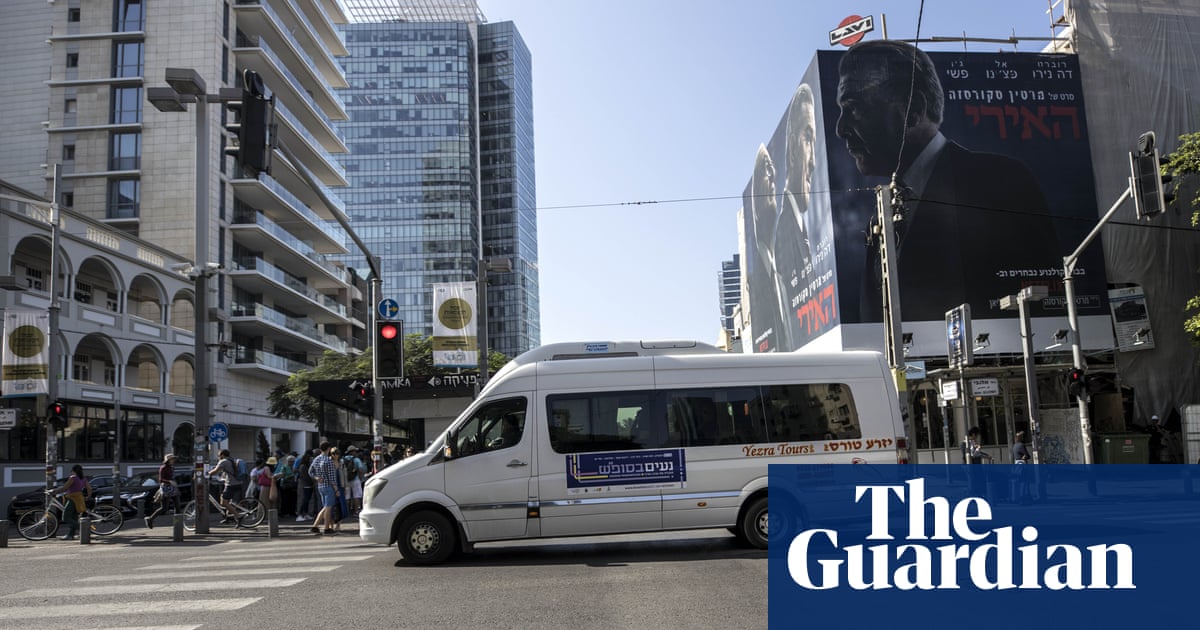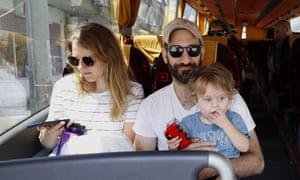Minibuses that run on Friday evenings and Saturdays buck states religious restrictions

Tel Aviv is one of Israels most dynamic cities, but the latest local craze could appear fairly humdrum to outsiders a bus service that runs at weekends.
Packed 19-seat minibuses fill up fast with passengers, who excitedly gossip about the new routes. People patiently queue at bus stops, knowing they might have to wait for two or three buses to pass before there is a space. Still, they are upbeat. Its a pleasure, said Ben Uzan, a 30-year-old electronic engineer. Its a blessed initiative.
Israel is well-connected with buses, trains and trams but the Jewish state upholds unique religious restrictions. Public transport is seriously reduced on the Sabbath, or Shabbat, and many Jewish parts of the country shut down completely.
Broadly enforced since the countrys founding, the policy has been fiercely defended by traditionalist rabbis. While majority Muslim towns and religiously mixed municipalities, such as Haifa, have separate rules, Jewish majority areas have long upheld the policy.
Now, and for the first time, public transportation is available on the holy day of rest nightfall Friday to nightfall Saturday in Tel Aviv, the epicentre of secular Israel, where residents have been demanding a change for decades. A limited service began in late November with free buses connecting Tel Aviv with satellite cities surrounding it.
Proponents of the scheme say the religious rules disproportionately affect the poor, as secular families with cars can simply drive.
A recent survey found 60% of Israelis were in favour of public transport services on Shabbat, as long as their routes avoid areas where there is a religious or ultra-Orthodox majority. Some 97% of ultra-Orthodox respondents were opposed.
It should be standard, like every big city in the world, said Liron Langer, 39, as he waited at a bus stop in the southern district of Florentin.
I am sure opinions are divided, but if you ask people around here, you will find a mayor consensus on why this is positive. In cities like Jerusalem or other more ultra-Orthodox cities, they will oppose it because it breaks the status quo.

Tel Avivs deputy mayor for transport, Meital Lehavi, said the municipality had tried to accommodate demands from rabbis. We had, for example, one station near a synagogue, and we moved it. We dont want this to be an issue for a fight Live and let live, so that each person can do things their way on Shabbat.
The minibuses were an instant hit, filling quickly on their first run. Now local authorities intend to use full-size buses, and more largely secular municipalities are expected to implement the scheme.
The left-leaning Haaretz newspaper even dedicated a lead editorial to praising the service, saying transportation was a basic need like electricity and water. Just as the latter continue to flow through the pipes and high tension wires on Shabbat and holidays, so transportation must be made available to the public seven days a week, it said.
Although secular sections of society have been fighting this battle for years, the timing was critical to the services success. Israels government includes powerful ultra-Orthodox figures, and the minister for transport, Bezalel Smotrich, is a far-right religious nationalist. However, an ongoing political crisis after two inconclusive elections has plunged the government into an extended deadlock.
With little warning, the Tel Aviv municipality swiftly launched the service. Instead of attempting to win unlikely approval from the ministry for a paid service, they made the buses free.
Smotrich said he was pained by the move and would pressure local authorities to prevent serious damage to the Sabbath. However, it could prove difficult to reverse the bus scheme now it is in operation.
One of the drivers, who transports passengers from Jaffa to Tel Aviv, said his first Shabbat run felt like a historic day. I took the mayor and his deputy for a ride. When we started, it was a big surprise for everyone, said Bilal Zoabi, who drives school buses during the week.
Since then, he says he fills up halfway through his journey, as the route is so popular. Passengers have been cheerful, he adds, and not just because it is free. People have asked for this a lot, and it took them a long time to do it. There is a population here that wants to travel on Saturday. In the end, they earned it.
Read more: https://www.theguardian.com/cities/2019/dec/28/secular-israel-sabbath-buses


Recent Comments